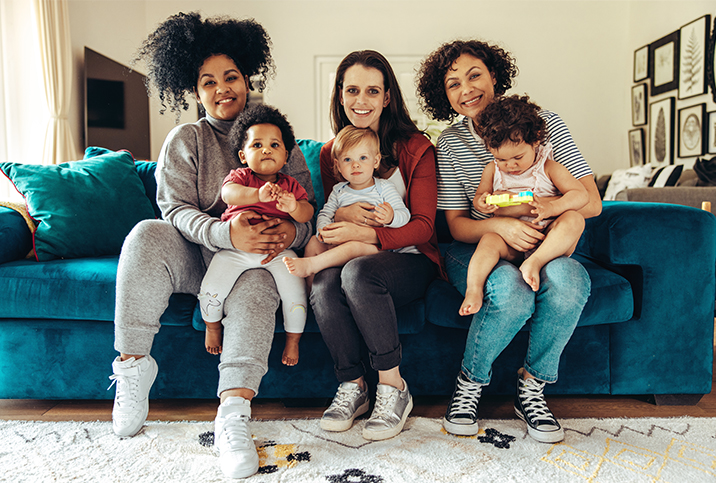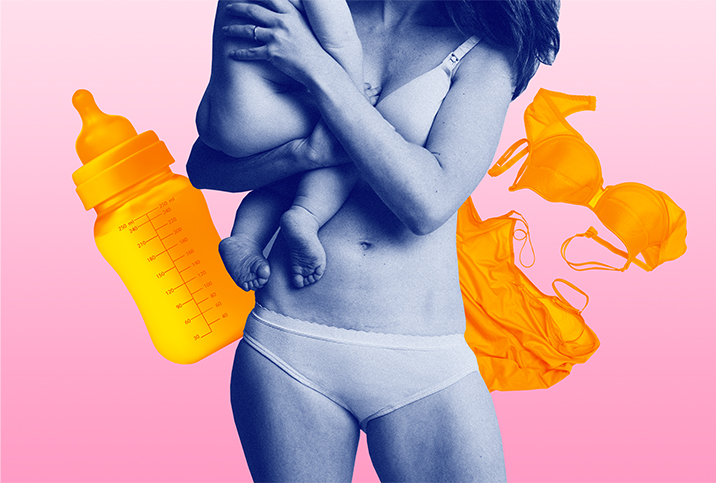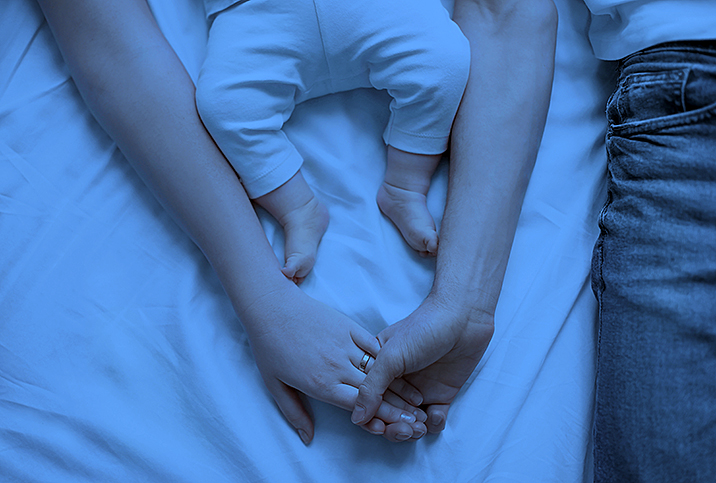What Your Period Looks Like Postpartum

While pregnancy comes with some not-so-fun symptoms, it also comes with one big benefit—OK, besides the bundle of joy you get at the end—and that's no periods.
Although you may hear a lot about what to expect from your body during and after pregnancy, the information surrounding what to expect from your menstrual cycle in the postpartum stage is sparse. Luckily, we have answers to the questions you may have about your period after pregnancy.
When does your period come back?
It's normal for new moms to bleed for up to three weeks after giving birth. Although this looks and feels a lot like a period, it's actually a mix of blood and uterine tissue (called lochia) that your body no longer needs now that you've given birth.
Similar to a period, this blood also goes from light to dark over time and can include spotting and heavy flow. In fact, you may even get some cramping since the muscles in your uterus are now returning to their normal size after expanding during labor. During these few weeks, even though you have symptoms and bleeding that look and feel exactly like a period, it's not.
For a period to take place, your body needs to be releasing eggs from your ovaries, and it can take a while for this to happen. Although there's no set time, most women start menstruating again between six and 12 weeks after they give birth. "It totally varies from woman to woman as to when you start menstruating after giving birth," said Kate Mundell, an expert midwife at Naytal, an online clinic in the United Kingdom. "It is very dependent on how you are feeding. If you are breastfeeding, you shouldn't ovulate until you are no longer exclusively breastfeeding and, therefore, won't have your periods until that time. If you are bottle-feeding, you can expect your period to return anytime after about six to eight weeks."
It's important to note that only exclusive breastfeeding—nursing every four hours during the day and every six hours during the night—provides this period protection, and only for the first six months after giving birth.
"When you do it perfectly, the LAM [lactational amenorrhea method] birth control method can be about as effective as hormonal contraceptives [like the pill]. About 2 out of 100 people who use breastfeeding as birth control get pregnant in the six months it can be used after a baby is born," states the Planned Parenthood website. After six months, your baby begins eating solid foods and sleeping longer at night, and LAM is no longer an effective birth control method.
Also, just because you haven't had your period yet doesn't mean you can't get pregnant again.
"If you are not breastfeeding, you are fertile again approximately three weeks after giving birth. It is important to remember that you will ovulate before your first period, and so it is recommended to use contraception as soon as you have sex again if you do not want to become pregnant again," said Hannah O'Sullivan, a resident midwife at the Positive Birth Company in the U.K. "There are lots of contraceptives that can be started immediately after birth. You may even be able to get them before you leave the hospital."
Is your period the same as it was before?
A "normal" period tends to last between five and seven days and occurs every four weeks. Most menstruators tend to bleed more in the first day or two of their period and experience mild cramping, which is usually relieved with over-the-counter pain medication. But is this what your period will look like after giving birth?
"After delivery, most people will go back to their period pattern that they had before they were pregnant. And so if you had regular, predictable periods, odds are you're going to go back to regular, predictable periods," said Cindy Duke, M.D., a fertility expert and virologist in Las Vegas. "If you had a history of irregular, unpredictable periods, then you'll go back to those, but a portion of those who had a history of irregular periods do report that their periods became regular after they had a baby."
While your periods may be similar, your pain tolerance during menstruation may change postpartum.
"Similarly, there are women who report having extreme pain with their periods before they got pregnant. This changes after you've had a baby for a few reasons," Duke added. "Your pain threshold probably changed after labor; a lot of what people detect as horrible pain changes after giving birth. For others, the act of stretching out the uterus as the pregnancy grows may have also changed how the pain receptors in your body respond to that stretch or cramp."
Does anything delay your period?
People who breastfeed exclusively often don't get their periods till they stop, due to the lack of ovulation during this time. If you aren't breastfeeding exclusively, you may have irregular periods or get them at a slightly later stage.
Your period can also be affected by your baby's sleep schedule. If your baby wakes up frequently at night to eat, your body produces more prolactin, the milk-producing hormone that also works to suppress your menstrual cycle. You may notice your period going back to normal around the time your baby starts to sleep through the night, because you're producing less prolactin. This process can also happen around the time you start to introduce solids into your baby's diet as they drink less milk.
Otherwise, it's safe to expect your period to be very similar to the way it was before you gave birth. Consult your doctor if you notice any symptoms that are out of the ordinary or you feel like something isn't right.


















